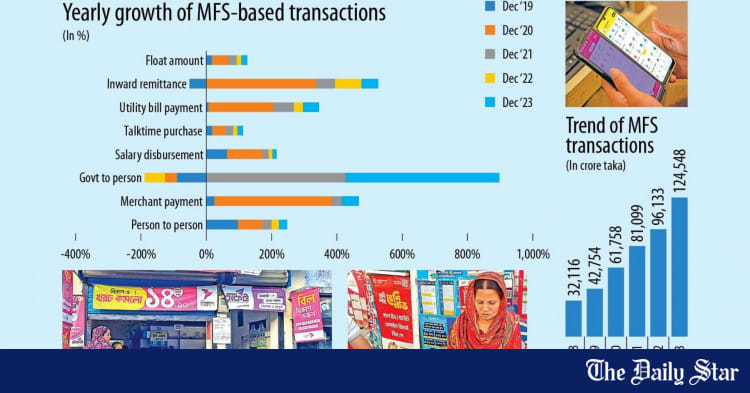Growth of mobile financial services in Bangladesh | MFS transactions grow fourfold in five years

Bangladesh is registering a consistent growth in transactions through mobile financial services (MFS) and it grew four times to over Tk 4,100 crore in the last five years to December 2023.
In December 2018, the daily average transaction through the digital platform was Tk 1,070 crore, according to data from Bangladesh Bank (BB).
The popularity of MFS increased as it made available a number of activities in the palm of hand such as money transfer, talktime purchase, payment of utility bills and for online and offline purchases.
At the end of December 2023, overall transactions through MFS surged 30 percent year-on-year to Tk 124,548 crore, according to the BB data.
In that month, cash-in and cash-out grew by 29 percent and 31 percent year-on-year respectively.
Even, transaction through MFS rolled out in 2011 in Bangladesh posted a two-year high growth in the 12th month of last year.
“Due to convenience in digital transactions, the MFS industry has been experiencing a substantial growth in cashless spending by the customers for the last couple of years,” said Shamsuddin Haider Dalim, head of corporate communications and public relations at bKash Ltd, the largest MFS provider in Bangladesh.
In general, he said, people spend more during festival seasons, special days, holidays and at the beginning and end of a year.
“The month of December falls within the holiday season when many people travel and spend.”
Moreover, social gatherings, family reunions, weddings also take place during this time, he said.
The higher spending by people in such occasions fuel the overall growth in MFS transactions too, he said.
“Expatriates send more remittance at the yearend through MFS channel as well.”
The central bank data showed that the government’s distribution of money through MFS for social protection schemes skyrocketed in December 2023 from a year ago.
At the same time, people also showed increasing interest to shop and pay through MFS.
For example, merchant payment through the mobile financial services shot up 53 percent year-on-year to Tk 5,518 crore at the end of December 2023 when remittance sent through MFS grew 51 percent year-on-year to Tk 586 crore.
“MFS is not just a money transfer tool anymore, rather it has evolved into a platform of different financial services designed to meet people’s day-to-day needs,” said Muhammad Zahidul Islam, vice-president and head of media and communications at Nagad Ltd, one of the major MFS operators.
“From mobile recharge to utility bill payments to shopping, all now can be done on our MFS wallets.”
“That is why people are now turning to more and more MFS services which are convenient, secure, and affordable,” he added.
In December last year, MFS operators recorded a 49 percent year-on-year spike in payment of utility bills, which hit Tk 2,903 crore.
Money transfer from person-to-person soared 25 percent year-on-year to Tk 34,277 crore in that month.
Salary disbursement through MFS platforms increased too. But its growth was lowest among all the major services provided by the operators.
Islam said the way mobile money operators are now coming up with new and diversified financial services for customers, MFS transactions will continue to surge in the days to come.
In 2023’s December, daily average transactions through Nagad stood at Tk 1,400 crore, mainly riding on government disbursements, various payments and mobile recharge, he added.
At present, the country has over 22 crore MFS accounts and more than half of them belong to people living in rural areas, according to BB data.
“The growth so far is positive. There is enough reason to be hopeful,” said Md Nehal Ahmed, professor of Bangladesh Institute of Bank Management, adding that digital transaction will increase in near future.
“Convenience here is the main factor and the Covid-19 pandemic was a turning point for the spike in MFS-based transactions.”
However, challenges are still there, he said.
The lack of awareness on the benefits of digital transaction, the fear of being defrauded and the popularity of paper documents of transactions are some of the many reasons which have slowed the growth of MFS transaction, he added.
The transaction cost is another reason, Ahmed said.
Many people want to avoid making big MFS transactions to keep service charges lower, he added.
At present, the users have pay up to Tk 20 to withdraw every Tk 1,000 from the MFS agents.
Ahmed said digital banks, for which the central bank has started giving permission, might throw a challenge to the MFS providers by offering lower transaction fees than the current rates.
link

 For all latest news, follow The Daily Star’s Google News channel.
For all latest news, follow The Daily Star’s Google News channel. 





